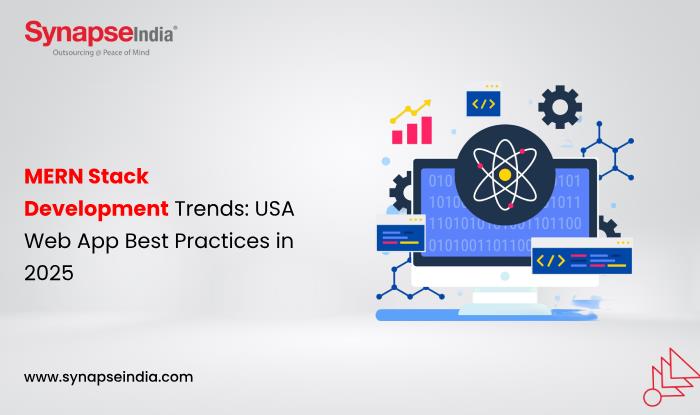 24 Sep 2025
24 Sep 2025
In 2025, web apps built with the MERN stack (MongoDB, Express.js, React, and Node.js) are shaping the digital experience in the USA. Businesses are demanding apps that load quickly, handle heavy traffic, and protect user data.
As a MERN Stack Development Company in the USA, we see developers embracing approaches that improve performance and usability. 66% of developers work with JavaScript, driving wider adoption of the MERN stack (Stack Overflow, 2025)
Staying current with trends helps us deliver apps that meet expectations and maintain engagement across web and mobile users.

Developers are increasingly integrating advanced approaches to improve functionality and responsiveness. Key trends include:
40.8% of developers use Node.js, reflecting MERN’s broad adoption (Statista). USA businesses face strict regulations, varied users, and high uptime requirements. MERN stack trends address these needs:
Building successful MERN apps requires following practical steps aligned with modern trends. Applying these best practices ensures better performance, security, and user experience.
Following these practices helps apps stay up-to-date and meet high expectations without overcomplicating development.
Selecting the right development partner is key for delivering apps that grow with your business. We at SynapseIndia understand USA business needs and have extensive experience developing MERN applications across industries.
Partnering with us means access to skilled developers who build apps that perform, scale, and adapt efficiently.

MERN stack trends in 2025 offer USA businesses faster, smarter, and secure web apps. By combining AI, serverless setups, edge computing, microservices, and PWAs, we help apps perform better and adapt quickly. Applying best practices ensures long-term stability and user satisfaction.
MERN stands for MongoDB, Express.js, React, and Node.js, using JavaScript across the stack. It speeds up development and simplifies building complete applications.
Freelancers usually charge $50–150 per hour, while agencies range from $80–200. Offshore partners like us can reduce costs by up to 60%.
Yes, with caching, load balancing, and MongoDB sharding, MERN can scale effectively. Node.js supports large numbers of concurrent users.
It can feel steep at first but becomes manageable with structured learning. Small projects help connect frontend and backend skills.
MERN may need server-side rendering for better SEO results. Next.js offers built-in SEO support but is less flexible for customization.

